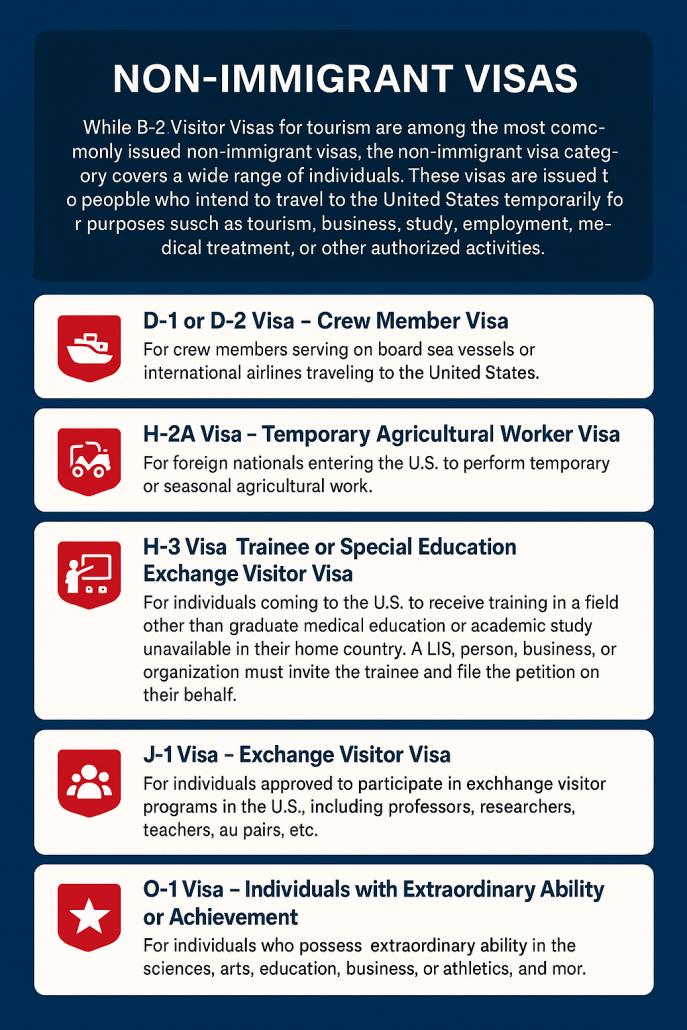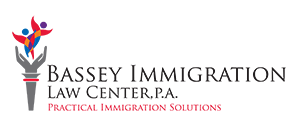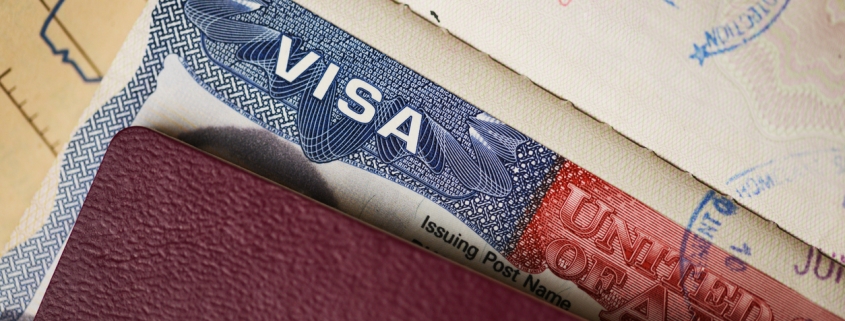What are the Different Types of U.S. Visas?
The United States issues two main types of visas: non-immigrant visas, for temporary stays such as tourism, study, work, or medical treatment; and immigrant visas, for those seeking permanent residence, often through family sponsorship or employment. Common examples include the business visa (B-1), the religious visa (R-1), the student visa (F-1), and family-based visas like the spousal visa (IR-1 or CR-1).
At Bassey Immigration Law Center, P.A., we help you determine the visa category that best fits your circumstances and assess whether you meet the eligibility requirements under U.S. immigration law. Our team also guides you through each step of the application process, ensuring that all required forms and supporting documentation are accurately prepared and submitted on time. Whether you are seeking a temporary visa to enrich your life in the U.S. or pursuing permanent residence to build your future here, we welcome the opportunity to support your journey.
Non-immigrant Visas

While B-2 Visitor Visas for tourism are among the most commonly issued non-immigrant visas, the non-immigrant visa category covers a wide range of individuals. These visas are issued to people who intend to travel to the United States temporarily for purposes such as tourism, business, study, employment, medical treatment, or other authorized activities.
Examples of Non-Immigrant Visas include:
- D-1 or D-2 Visa – Crew Member Visa: For crew members serving on board sea vessels or international airlines traveling to the United States.
- H-2A Visa – Temporary Agricultural Worker Visa: For foreign nationals entering the U.S. to perform temporary or seasonal agricultural work.
- H-3 Visa – Trainee or Special Education Exchange Visitor Visa: For individuals coming to the U.S. to receive training in a field other than graduate medical education or academic study unavailable in their home country. A U.S. person, business, or organization must invite the trainee and file the petition on their behalf.
- J-1 Visa – Exchange Visitor Visa: For individuals approved to participate in exchange visitor programs in the U.S., including professors, researchers, teachers, au pairs, etc.
- O-1 Visa – Individuals with Extraordinary Ability or Achievement: For individuals who possess extraordinary ability in the sciences, arts, education, business, or athletics, and more.
- T Visa – Victims of Human Trafficking Visa: For individuals who are or have been victims of severe forms of human trafficking and are assisting law enforcement in the investigation or prosecution of human trafficking cases.
Immigrant Visas
Immediate relatives of U.S. citizens, including spouses, unmarried children under 21, and parents of U.S. citizens age 21 or older, make up a significant portion of immigrant visas. Lawful permanent residents (green card holders) may also petition for certain family members, but these fall under the family preference visa categories, subject to annual limits and longer wait times.
The K-1 fiancé(e) visa is a non-immigrant visa that allows a foreign fiancé(e) of a U.S. citizen to enter the United States and marry within 90 days. After the marriage, they may apply to adjust their status and become a lawful permanent resident.
If you are married to a U.S. citizen, you may be eligible for a spousal visa, which comes in two forms:
- IR-1 visa – For spouses of U.S. citizens when the marriage is more than two years old at the time of green card approval.
- CR-1 visa – For spouses of U.S. citizens when the marriage is less than two years old at the time of approval. This visa grants conditional permanent residence, valid for two years.
To begin the process, the U.S. citizen or lawful permanent resident sponsor must file Form I-130, Petition for Alien Relative, with U.S. Citizenship and Immigration Services (USCIS).
Business and Employment Visas
Business and employment-based visas fall into two main categories: non-immigrant (for temporary stays) and immigrant (for permanent residence).
If you are planning a temporary business visit to the United States, you may be eligible for a business visa such as the B-1 Business Visitor Visa. It allows foreign nationals to engage in specific business-related activities — like attending conferences, negotiating contracts, or participating in short-term training — without accepting employment or receiving a salary from a U.S. source.
For individuals coming to the U.S. to work in religious capacities, the religious visa, the R-1 Religious Worker Visa, allows ministers and other religious workers to enter temporarily to perform religious duties for a bona fide nonprofit religious organization. Some religious workers may later qualify for permanent residence through the EB-4 Special Immigrant Religious Worker category.
Schedule a Consultation in Tampa or Clearwater
The U.S. visa process is often challenging. When you have visa issues or questions, you need the help of an experienced Florida immigration lawyer at Bassey Immigration Law Center. The sooner you contact us, the sooner we can begin the hard work of advocating for you. Schedule an affordable consultation today.
About Bassey Immigration Law Center, P.A.
Bassey Immigration Law Center, P.A., led by attorney Aniefiok Bassey, provides comprehensive immigration services to individuals, families, and businesses in Florida and beyond. With over 20 years of experience, the firm assists clients with a wide range of immigration matters, from family reunification and green cards to business visas and deportation defense. The diverse, multilingual team is dedicated to supporting clients through the complex immigration process, with a special focus on citizenship, asylum, and LGBTQ+ immigration needs. They offer affordable initial consultations and are committed to delivering personalized, strategic guidance for achieving clients’ immigration goals.



